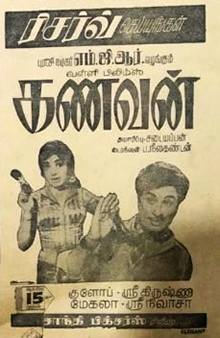Kanavan
| Kanavan | |
|---|---|
 Theatrical release poster | |
| Directed by | P. Neelakantan |
| Screenplay by | Sornam |
| Story by | M. G. Ramachandran |
| Produced by | Sadayappan |
| Starring | M. G. Ramachandran Jayalalithaa |
| Cinematography | V. Ramamoorthy |
| Edited by | G. D. Joshi |
| Music by | M. S. Viswanathan |
Production company | Valli Films |
Release date |
|
Running time | 152 minutes[1] |
| Country | India |
| Language | Tamil |
Kanavan (ⓘ transl. Husband) is a 1968 Indian Tamil-language film, directed by P. Neelakantan, starring M. G. Ramachandran and Jayalalithaa, with C. R. Vijayakumari, S. A. Ashokan, Cho among others. It was released on 15 August 1968.
Plot
Vellaiya is falsely accused of murdering a cashier named Ganapathy. Meanwhile, Rani a wealthy daughter of Chidambara Pillai, who hates marriages and wants to be freed from the humiliated Manogar, comes to see Rani after Chidambara Pillai's invitation. Manogar gets angry and insults Chidambara Pillai about Rani's behaviour. Chidambara Pillai has a heart-attack and writes a will based on Manager Mani's advise and dies. To get inheritance, Rani has to urgently marry someone. She chooses a person who is sentenced to death - the good Vellaiya. Vellaiya, though reluctant initially, marries Rani. However, due to a twist of incident, Vellaiya is acquitted at the last minute, and Vellaiya comes to settle down with his beautiful Rani. He has decide well to give her a lesson in the hardness of life.
Cast
- M. G. Ramachandran as Vellaiya[1]
- Jayalalithaa as Rani[1]
- S. A. Ashokan as Manager Mani
- R. S. Manohar as Manogar
- Cho Ramaswamy as Advocate Vardhan
- C. R. Vijayakumari as Ponni, Velaiya's sister
- Manorama as Thenmozhi, Vardhan's wife
- Sundari Bai as Paruvadham, S. Paramasivam's wife.
- Usilai Mani as Servant
- Ennatha Kannaiya as the doctor
- T. K. S. Natarajan as Prisoner
- Shanmughasundari as Kaliyani
- S. N. Parvathy as Neighbor
- C. Vasantha as Azhagasan's wife
- Justin as Nadjappa
- S. Ramarao as Advocate S. Paramasivan B.A.B.L. Paruvadham's husband and Thenmozhi's father.
- Trichy Soundarrajan as Chidhambaram Pillai, Rani's father.
- "Sattaampillai" K. N. Venkatraman as the accountant of Chidhambaram Pilai
- K. Kannan as Azhagesan
- Thirupadhiswamy as Ponni's father-in-law
- Vijayan as a lawyer
- T. K. S. Chandran as Ponni's husband
Production
The film was inspired by two narratives – the Russian novel Woodcutter and the English play The Taming of the Shrew by William Shakespeare.[2]
Soundtrack
The music was composed by M. S. Viswanathan.[3]
| Song | Singers | Lyrics | Length |
|---|---|---|---|
| "Ennaporuthamadi Mama" | L. R. Eswari & chorus | Vaali | 04:13 |
| "Unmayein Siripai Rasikiraen" | T. M. Soundararajan with dialogues | Alangudi Somu | 03:01 |
| "Nan Uyir Pizhaithen" | T. M. Soundararajan | Vaali | 03:43 |
| "Adi Aathi Nee Yaruku Pethi" | T. M. Soundararajan | Alangudi Sômu | 04:02 |
| "Neenga Nenacha Nadakatha" | P. Susheela | Vaali | 04:06 |
| "Mayangum Vayathu" | T. M. Soundararajan & P. Susheela | Vaali | 03:12 |
Release
Kanavan was released on 15 August 1968.[4] When the film was released at Madurai's Thangam Theatre, gatecrashes and stampedes occurred, leading to three casualties.[5] The film was dubbed into Hindi as Aakhri Nishan.[6]
References
- ^ a b c Rajadhyaksha & Willemen 1998, p. 396.
- ^ Sri Kantha, Sachi (29 October 2015). "MGR Remembered – Part 31". Ilankai Tamil Sangam. Archived from the original on 22 June 2020. Retrieved 2 October 2020.
- ^ "Kanavan (1968)". Music India Online. Archived from the original on 11 July 2022. Retrieved 2 October 2020.
- ^ "எம்.ஜி.ஆர். நடித்த படங்களின் பட்டியல்". Ithayakkani (in Tamil). 2 April 2011. Archived from the original on 14 November 2018. Retrieved 2 October 2020.
- ^ Kavitha, S. S.; Shrikumar, A. (21 September 2011). "A tear for 'Thangam'". The Hindu. Archived from the original on 27 February 2021. Retrieved 2 October 2020.
- ^ Joshi, Namrata (7 December 2016). "Jayalalithaa's fleeting Hindi cinema connect". The Hindu. Archived from the original on 20 December 2017. Retrieved 2 October 2020.
Bibliography
- Rajadhyaksha, Ashish; Willemen, Paul (1998) [1994]. Encyclopaedia of Indian Cinema. British Film Institute and Oxford University Press. ISBN 0-19-563579-5.
